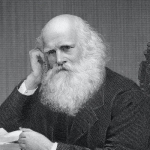1
The autumn shade is thin. Grey leaves lie faint
Where they will lie, and, where the thick green was,
Light stands up, like a presence, to the sky.
The trees seem merely shadows of its age.
From off the hill, I hear the logging crew,
The furious and indifferent saw, the slow
Response of heavy pine; and I recall
That goddesses have died when their trees died.
I sensed in its cool breath and in its voice
A living form, darker than any shade
And without feature, passionate, yet chill
With lust to fix in ice the buoyant rim—
Ancient of days, the mother of us all.
Now, toward his destined passion there, the strong,
Vivid young man, reluctant, may return
From suffering in his own experience
To lie down in the darkness. In this time,
Each morning, when I wake, I assent to wake.
The shadow of my fist moves on this page,
Though, even now, in the wood, beneath a bank,
Coiled in the leaves and cooling rocks, the snake
Does as it must, and sinks into the cold.
2
Nights grow colder. The Hunter and the Bear
Follow their tranquil course outside my window.
I feel the gentian waiting in the wood,
Blossoms waxy and blue, and blue-green stems
Of the amaryllis waiting in the garden.
I know, as though I waited what they wait,
The cold that fastens ice about the root,
A heavenly form, the same in all its changes,
Inimitable, terrible, and still,
Its light declares my books and pictures. Gently,
A dead soprano sings Mozart and Bach.
I drink bourbon, then go to bed, and sleep
In the Promethean heat of summer’s essence.
3
Awakened by some fear, I watch the sky.
Compelled as though by purposes they know,
The stars, in their blue distance, still affirm
The bond of heaven and earth, the ancient way.
This old assurance haunts small creatures, dazed
In icy mud, though cold may freeze them there
And leave them as they are all summer long.
I cannot sleep. Passion and consequence,
The brutal given, and all I have desired
Evade me, and the lucid majesty
That warmed the dull barbarian to life.
So I lie here, left with self-consciousness,
Enemy whom I love but whom his change
And his forgetfulness again compel,
Impassioned, toward my lost indifference,
Faithful, but to an absence. Who shares my bed?
Who lies beside me, certain of his waking,
Led sleeping, by his own dream, to the day?
4
If I ask you, angel, will you come and lead
This ache to speech, or carry me, like a child,
To riot? Ever young, you come of age
Remote, a pledge of distances, this pang
I notice at dusk, watching you subside
From tree-tops and from fields. Mysterious self,
Image of the fabulous alien,
Even in sleep you summon me, even there,
When, under his native tree, Odysseus hears
His own incredible past and future, whispered
By wisdom, but by wisdom in disguise.
5
Thinking of a bravura deed, a place
Sacred to a divinity, an old
Verse that seems new, I postulate a man
Mastered by his own image of himself.
Who is it says, I am? Sensuous angel,
Vessel of nerve and blood, the impoverished heir
Of an awareness other than his own?
Not these, but one to come? For there he is,
In a steel helmet, raging, fearing his death,
Carrying bread and water to a quiet,
Placing ten sounds together in one sound:
Confirming his election, or merely still,
Sleeping, or in a colloquy with the sun.
6
Slips and strains in the mire, and I remember
Driving in France: weapons-carriers and jeeps;
Our clothes and bodies stiffened by mud; our minds
Diverted from fear. We labor. Overhead,
A plane, Berlin or Frankfurt, now New York.
The car pulls clear. My neighbor smiles. He is old.
Was this our wisdom, simply, in a chance,
In danger, to be mastered by a task,
Like groping round a chair, through a door, to bed?
7
A dormant season, and, under the dripping tree,
Not sovereign, ordering nothing, letting the past
Do with me as it will, I savor place
And weather, air and sun. Though Hercules
Confronts his nature in his deed, repeats
His purposes, and is his will, intact,
Magnificent, and memorable, I try
The simplest forms of our old poverty.
I seek no end appointed in my absence
Beyond the silence I already share.
8
I drive home with the books that I will read.
The streets are harsh with traffic. Where I once
Played as a boy amid old stands of pine,
Row after row of houses. Lined by the new
Debris of wealth and power, the broken road.
Then miles of red clay bank and frugal ground.
At last, in the minor hills, my father’s place,
Where I can find my way as in a thought—
Gardens, the trees we planted, all we share.
A Cherokee trail runs north to summer hunting.
I see it, when I look up from the page.
9
In nameless warmth, sun light in every corner,
Bending my body over my glowing book,
I share the room. Is it with a voice or touch
Or look, as of an absence, learned by love,
Now, merely mine? Annunciation, specter
Of the worn out, lost, or broken, telling what future.
And him who reads here. Restless, he will stir,
Look round, and see the room renewed and line,
Color, and shape as, in desire, they are,
Not shadows but substantial light, explicit,
Bright as glass, inexhaustible, and true.
1O
My shadow moves, until, at noon, I stand
Within its seal, as in the finished past.
But in the place where effect and cause are joined,
In the warmth or cold of my remembering,
Of love, of partial freedom, the time to be
Trembles and glitters again in windy light.
For nothing is disposed. The slow soft wind
Tilting the blood-root keeps its gentle edge.
The intimate cry, both sinister and tender,
Once heard, is heard confined in its reserve.
My image of myself, apart, informed
By many deaths, resists me, and I stay
Almost as I have been, intact, aware,
Alive, though proud and cautious, even afraid.


















Comment form: